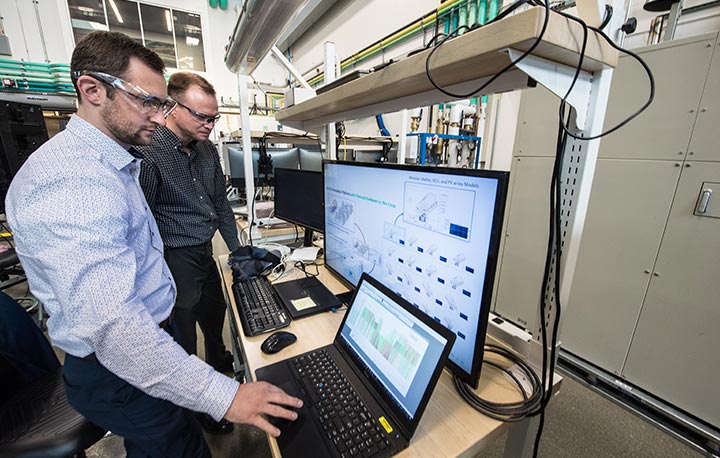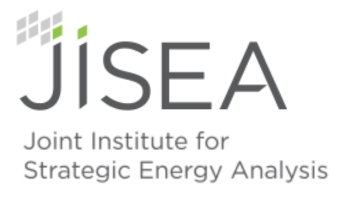JISEA Launches Green Computing Catalyzer To Reduce Energy Use and Carbon Emissions of Computing Systems

NREL researchers use a high-performance computer in NREL's Energy Systems Integration Facility. Photo by Dennis Schroeder, NREL
May 25, 2022—Computers are everywhere, from commerce to government to our everyday lives.
As demand for high volumes of data processing, data analysis, and artificial intelligence increases, computing systems have become burgeoning consumers of energy and contributors of carbon emissions.
To understand how to design, manufacture, use, and dispose of computers with minimal environmental impact, the Joint Institute for Strategic Energy Analysis (JISEA) launched the new Green Computing Catalyzer—the third catalyzer in the JISEA Catalyzers initiative, a program that is accelerating the clean energy transition through collaboration.
"Computational research at NREL has historically focused on applying computing resources to answer questions about energy efficiency and renewable energy," said Charles Tripp, senior computational scientist at the National Renewable Energy Laboratory (NREL) and principal investigator for the Green Computing Catalyzer. "Now, through the catalyzer, we have the opportunity to study computing itself as the serious energy research challenge it's become."
The Move to Algorithmic Energy Efficiency
Since the dawn of the computer age, computational efficiency, or the number of computations that can be completed per kilowatt-hour of electricity used, doubled nearly every year and a half with hardware improvements.
Faster and more reliable computing has enabled many industries to store and analyze large, complex data sets. However, computing systems have to use more energy to work with large data—and computational efficiency gains have started to plateau over the past decade.
"Energy efficiency gains in computing have been slowing in recent years," Tripp said. "We can no longer assume that the hardware will simply become significantly more efficient each year. That means that to further increase computational energy efficiency, we must improve the efficiency of the software."
Some large data centers such as NREL's High-Performance Computing system use water to cool the systems and efficiently capture waste heat that is then used throughout NREL's offices and laboratory space. Still, the energy consumption of computers has become a broader concern with the diminishing computational efficiency and rapid rise of energy-intensive blockchain technology, artificial intelligent systems, and cryptocurrency—driving a greater focus on algorithmic energy efficiency.
An energy-efficient algorithm can accomplish the same task on the same hardware using less energy—offering a potential pathway to making computers faster without using more energy. "Based on the hardware development trajectory, algorithmic energy efficiency will be coming to the forefront," Tripp said.
Over the next few years, the Green Computing Catalyzer will explore algorithmic energy efficiency in addition to ways to limit energy usage of computing and potential pathways to reuse, repair, or recycle hardware products and materials to support a circular economy. Through the Green Computing Catalyzer, JISEA and NREL analysts will develop a baseline of existing research within green computing, build a network of experts, and identify needs for further research, knowledge sharing, and collaborations in the field.
The Catalyzers Initiative
The JISEA Catalyzers initiative launched in May 2021 to bring together thought leaders from JISEA and NREL to leverage energy analysis, projects, data, and tools within specific research areas. The initiative is operated jointly with NREL, and each catalyzer aligns with a strategic priority at the laboratory.
"JISEA is built on the principle of breaking down silos to collaborate across diverse sectors," said Juan Torres, director of Energy Systems Integration at NREL. "The JISEA Catalyzers are creating communities of experts to understand work that's been done within a specific research area and to identify needs moving forward."
Each catalyzer is led by a principal investigator and incubated for 1–2 years before being launched into a new NREL-led research program. JISEA kicked off the initiative with the inaugural Energy and Atmospheric Systems Catalyzer and Sustainable Communities Catalyzer, which will graduate into a new NREL research program this year.
Help Catalyze Innovation
JISEA is looking for sponsors, use cases, and expert review panel members and practitioners across industries and sectors who are passionate about green computing. Please contact JISEA if interested.
Back to JISEA News >
